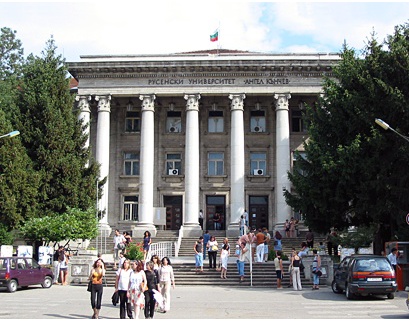








| Home |
| Background |
| Objectives |
| Management |
| Expected Results |
| Rules |
| Partners |
| Groups |
| Workplan |
| Meetings |
| Report |
| FLAGMAN System |
| Login |
| Control Panel |
| Documents |
| Forum |
| Webmaster |
|
Partners from Bulgaria, University of Rousse
The presence of Rousse in the history of Bulgaria can be measured not only by its nineteen centuries of architectural and industrial construction, but also by its rich cultural heritage and the spirit of enterprise. It was in Rousse where the first embassies were established, it was in Rousse where the first Bulgarian ship was built and where national shipbuilding industry began; it was in Rousse where the first Bulgarian chamber of commerce, insurance society, technical society, teachers' society, weather forecast station, printing press, film show, and railroad, were opened. It was again in Rousse where, for the first time in Bulgaria, the first geographical map, the first Bulgarian newspaper, and the first textbook in agriculture were published. Also, it was in Rousse where the foundations were laid for the professional courses in farming machinery. In 1909, the Higher Course in Pedagogic was established, later, in 1921, to become a Teacher Training College. In 1945, the citizens of Rousse initiated the idea of establishing a polytechnic, which was approved by Decision of the Ministry of Councils of 30 October 1945 and Act N 8618 of 14 November 1945. That was how the first higher technical school outside the capital came to existence. It took the new higher school a lot of time to develop into what it is today, the University of Rousse. For example, in 1954 was established the Institute for Mechanization and Electrical Supply of Agriculture, later to become the Higher Institute of Machine-building, Mechanization and Electrical Supply of Agriculture, and then the Higher Technical School 'Angel Kanchev'. By Decision N 37/21.07.1995 of the National Assembly, it was transformed into the University of Rousse 'Angel Kanchev'. More than 7 000 students are taught in modern laboratories and classrooms. Half of all faculty members are full professors and associate professors, or hold doctoral degrees. As a result of its long traditions and the support of the European Union through the TEMPUS programme, all technical courses have been updated and diversified. Also, a wide spectrum of new courses has been introduced in the fields of technology, humanities, management and economics. The University of Rousse has been recognized by the European TEMPUS Commission as one of the best 18 universities with the highest achievements in the educational reform among its counterparts in 11 Central European Countries. The University of Rousse was one of the eight Bulgarian Universities which entered successfully the first session of the SOCRATES/ERASMUS Programme in Bulgaria for the academic year 1999/2000. The financed within the Institutional Contract OMS and TS activities with nine European partner universities, support and further develop the European Policy of the University of Rousse on one hand, and on the other they implement the University Strategy of Development. The tradition and the geographical location of the University of Rousse determine its mission and its strategic role of an educational, scientific and intellectual center of the Rousse Region and of North-East Bulgaria on both national and international levels.
The University of Rousse is an autonomous state higher educational institution, which comprises eight main faculties, the Silistra branch of the University of Rousse, including a Faculty of Pedagogics, and a Technical College and a College of Technology in Razgrad.
The University of Rousse has undertaken practical steps to harmonize its educational process and its internal academic rules and regulations with the requirements of the Bologna Process. It has introduced the Bachelor's, Master's and PhD degrees and on successful completion of their study period students are awarded ECTS credits. The University of Rousse is prepared to issue the European diploma supplement. The University of Rousse is the only university in the present and former Rousse region (with a population of approximately 1 million), which complies with the international index "one higher education institution per one million people". The University ranks 13th among the largest higher education institutions comparing indexes, such as: number of state-approved vacancies for admission, overall number of students, number of doctoral study students, size of state subsidy, applicants versus approved vacancies ratio, etc. The University received a certificate for compliance of the system for quality control with the requirements of the ISO 9001:2000 standard, issued by B V Q I and valid until 26.03.2007. The University is a regular member of the European Universities Association. The University is a regular member of the Danube Rectors Conference. The University of Rousse was accredited on 13th May, 1999 by the National Evaluation and Accreditation Agency for a period of five years with the highest grade - "very good". The University of Rousse was accredited for the second time on 26th January, 2006 by the National Evaluation and Accreditation Agency for a period of six years with the highest grade - "very good". For more information please visit:
|
|||||



